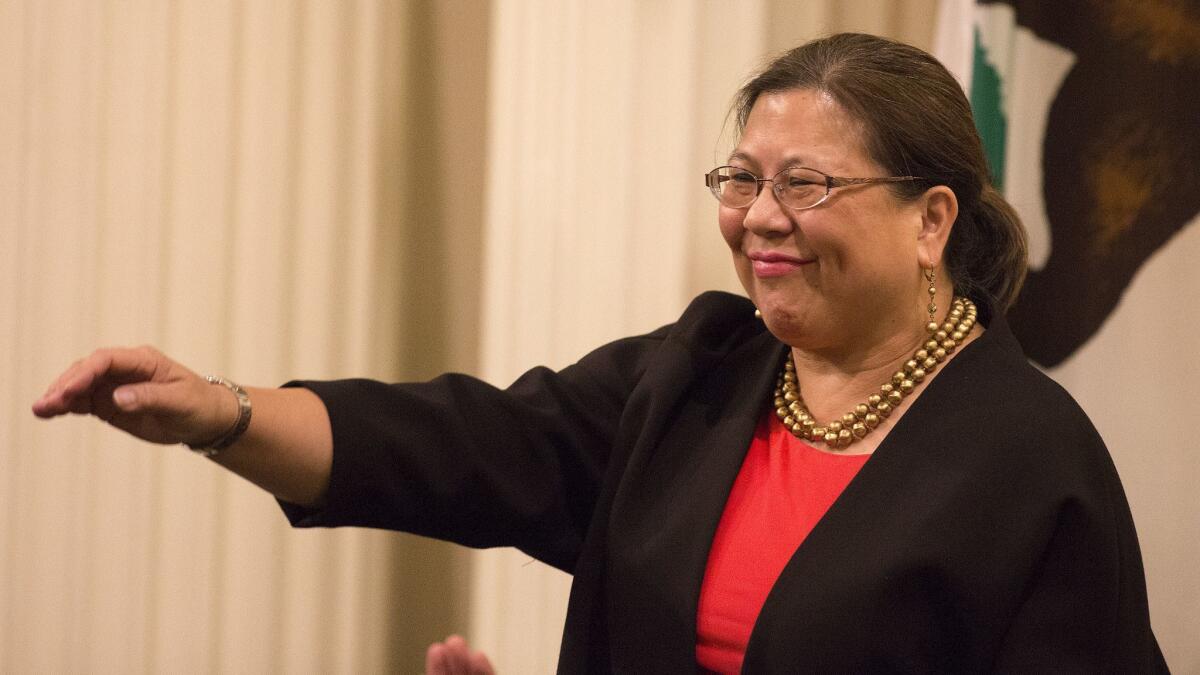California lawmakers want the state to collect data on drivers under the influence of pot

Reporting from Sacramento — After she was injured in a car accident allegedly caused by a driver impaired by pot, state Controller Betty Yee is backing a bill approved Monday by the Legislature that aims to begin addressing the problem of drugged driving on California roads.
The measure sent to Gov. Jerry Brown would require the California Highway Patrol to report on how many motorists stopped for impaired driving are allegedly under the influence of marijuana.
“It’s what other states have done — like Colorado and Washington — to at least start collecting state-level data,” Yee said. “They just want to understand the extent of cannabis-impaired driving.”
On July 13, Yee was riding in the back of a car that had stopped in traffic near Oakland when the vehicle was rear-ended by an automobile driven at a high rate of speed. The other car was driven by a 25-year-old man who was arrested on suspicion of being under the influence of cannabis.
Yee was knocked unconscious in the accident and said in an interview Thursday that she is still recovering from the bruising injuries.
“It’s a slow process, but I’ve got a job to do,” she said. “It’s not deterring me from continuing to do my job.”
Yee opposed Proposition 64, a 2016 ballot measure that legalized growing, selling and possessing marijuana for recreational use. She and others voiced concerns that the state was not prepared for the massive regulation required to protect public safety, and for other complications that could arise from the fact that marijuana remains an illegal drug under federal law.
Now, she said the cannabis industry must step up and do more to help make regulations work.
“What I am saying to the industry is, ‘Please come forward, you are the experts about your product,” Yee said. “Work with law enforcement and policymakers to make sure that the public can feel at ease about having public safety measures in place.”
State Sen. Jerry Hill (D-San Mateo) said the bill approved Monday is needed to determine the scope of the drugged-driving problem following voter approval of Proposition 64.
“As we have seen in other states that have legalized cannabis, an increase in cannabis drugged driving can almost certainly be expected due to legalization,” Hill said.
The measure was introduced by Assemblyman Ed Chau (D–Monterey Park), who noted law enforcement does not distinguish between drugged driving and driving-under-the-influence arrests involving alcohol when reporting statistics.
“Establishing a uniform mechanism to evaluate cannabis drugged-driving arrests will inform what policies are needed to address this dangerous behavior,” Chau said.
A lack of data on the problem has hindered efforts to establish a measurable state standard for drug-impaired driving, which is illegal in California. Law enforcement officers rely on visual evidence of impairment, such as cars drifting between lanes.
In Washington, which legalized cannabis in 2012, blood tests are conducted and drivers are presumed to be impaired if they have more than 5 nanograms of THC per milliliter in their bloodstream. California lacks such a standard, in part because there are questions about what level of THC results in impairment.
A recent study by the Rocky Mountain High Intensity Drug Trafficking Area, a group of law enforcement agencies from Colorado, said marijuana‐related traffic deaths in Colorado increased 48% since 2013, when that state legalized recreational use of marijuana.
Yee said there are other things the industry can do itself to make sure people know of the dangers of driving after using cannabis.
“I would like to see a broader public education campaign,” she told The Times. “I’m not indicting the industry by any means, but I think they are the experts on what’s out there, and I hope they can take some additional measures to inform the public.”
Coverage of California politics »
Twitter: @mcgreevy99
More to Read
Get the L.A. Times Politics newsletter
Deeply reported insights into legislation, politics and policy from Sacramento, Washington and beyond. In your inbox three times per week.
You may occasionally receive promotional content from the Los Angeles Times.











